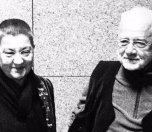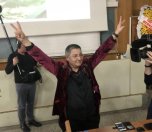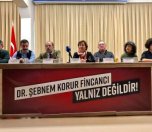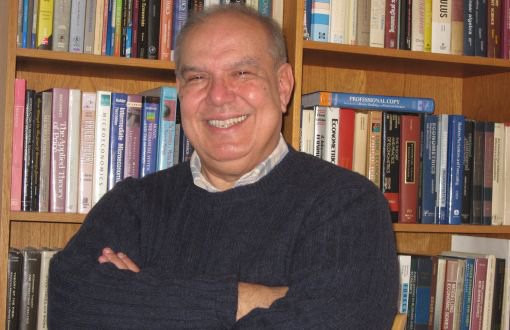Click to read the article in Turkish
Prof. Dr. Şebnem Korur-Fincancı, who has been sentenced to 2 years and 6 months in prison on charge of "propagandizing for a terrorist organization" for having signed the declaration entitled "We will not be a party to this crime", has spoken to bianet about the verdict.
CLICK - Prof. Dr. Şebnem Korur Fincancı Sentenced to 2 Years, 6 Months in Prison
Korur Fincancı has regarded the verdict given by the 37th Heavy Penal Court today (December 19) as "revenge of the Cizre Report", which was prepared by herself as Chair of Human Rights Association of Turkey (TİHV).
Reminding that the report was added to her file after Prosecutor's Office announced its opinion as to the accusations, she has said the following:
'The report is defense evidence, not crime evidence'
"The Cizre Report, which was added to the case file as new evidence, is not actually new. Because we already presented the report within our defense.
"I even made a PowerPoint presentation with photographs. I shared what we found in Cizre with the court.
"So this is not new evidence. Moreover, this is a defense evidence, not a crime evidence.
"There is an effort to increase the sentence. We already know that the Cizre Report hurt the state very much. As soon as the report was published, the state got me arrested within three months and sent to prison even though it was for 10 days.
What happened in Cizre?While the curfew declared in the district of Cizre in Turkey's southeastern province of Şırnak on December 14, 2015 was still in effect, Minister of Interior of the time Efkan Ala announced on February 11, 2016 that the operations of blockade were ended. However, the curfew in Cizre was rearranged in a way to be in force at nights as of March 2, 2016 and entry to/ exit from the district was prohibited until March 2, 2016. After the curfew was lifted in the neighborhoods of Cudi and Sur in Cizre, 177 dead bodies, 25 of which belonged to children, were found in the wreckages and debris of mainly 3 buildings and the houses in their vicinity. While the 103 of the deceased could be identified, 74 people were put to rest without being identified. The total number of the dead has been announced as 189. According to the report of the Peoples' Democratic Party (HDP), almost all of the dead bodies were beyond recognition because they were either burned or decomposed. The remnants of human bones and military ammunition were found in the basements. Forensic Experts also found remnants of human bones of children in the basements. |
'They continue to give us medals'
"So they were hurt. All to the good, they feel at least something. They are in fact struggling with guilty conscience. They are aware that hundreds of civilians were killed there and the situation was not as they declared to be. The sentence is actually for that.
"They would somehow give a sentence. For this reason, they calculate how they will take revenge from each one of us. We are facing a judicial process that a joint act, the will to not participate in a crime, is being tried separately.
"I think that it is an honor. They continue to give us medals."
'Imprisonment is an opportunity, not a trouble'
"Going into prison is not a trouble for me, on the contrary, it can be seen as an opportunity.
"Because the state, which did not let us into prisons as civil organizations who are striving for human rights, let me in as 'an official monitoring investigator'. Hence I will do my observations.
"Because the prisons, especially in this period, have allegedly become places where the heaviest torture takes place.
"At least I will see what happens on the scene, make my observations and continue to hurt the state."
'Very valuable documents for future law students'
Korur-Fincancı is of the opinion that one of the most important gains during the trials of academics is the network of solidarity which was formed:
"Everybody (the academics who are being tried) presents their own critical view of the government in a written form and puts them into state archives.
"Maybe not today, but in the future, postgraduate students of law will have brought very valuable documents into light.
"Secondly, this solidarity gained strength day by day. We, as total strangers, first got to know each other, then established friendly bonds, then became comrades, began to walk on the same way.
"Maybe we owe thanks to them, for bringing us together in this climate of silence and isolation."
'Valuable resources for journalism students too'
"What happened today will also make very valuable resources for journalism students too.
"This situation has an aspect of shame as well. They will see how shameful deeds were done in their profession. But they will also think about those who did honorable jobs. They will see honorable journalists."
About Şebnem Korur FincancıProf. Dr. Şebnem Korur Fincancı is a rights advocate and the Chair of the Human Rights Foundation of Turkey (TIHV). The Foundation has been involved in the documentation of the cases of torture, rehabilitation of its victims and provision of legal assistance to them. Şebnem Korur Fincancı is also one of the founding members of the Forensic Doctors' Association and has played the major role in the development of the United Nations reference standards on the investigation and documentation of the cases of torture, the Istanbul Protocol. She has conducted forensic investigations to expose torture in multiple countries and in 2014 she received the International Hrant Dink Award. She has also been one of the founders of the Turkish Penal Code Association. Devoting her professional life to the investigation and documentation of torture as well as struggle against it, Korur Fincancı has become one of the milestones in Turkey in that regard. Preparing reports on cases of torture and writing on medical ethics in the 1990s, when torture was prevalent in Turkey, she was met with the oppression and preventions by the state. In 1997, she became the Head of Forensic Medicine Department at İstanbul University. In 2004, she was dismissed from this post. In 2005, she was reinstated by the Administrative Court and as per the decision of the Council of Higher Education (YÖK). Şebnem Korur Fincancı also participated in the Editors-in-Chief on Watch campaign that was launched in solidarity with the Özgür Gündem newspaper, which was closed as per a Statutory Decree. Korur Fincancı was arrested on June 20, 2016 for having participated in the campaign and was released on June 30, 2016. |
(EKN/VK)





.jpg)





.jpg)


